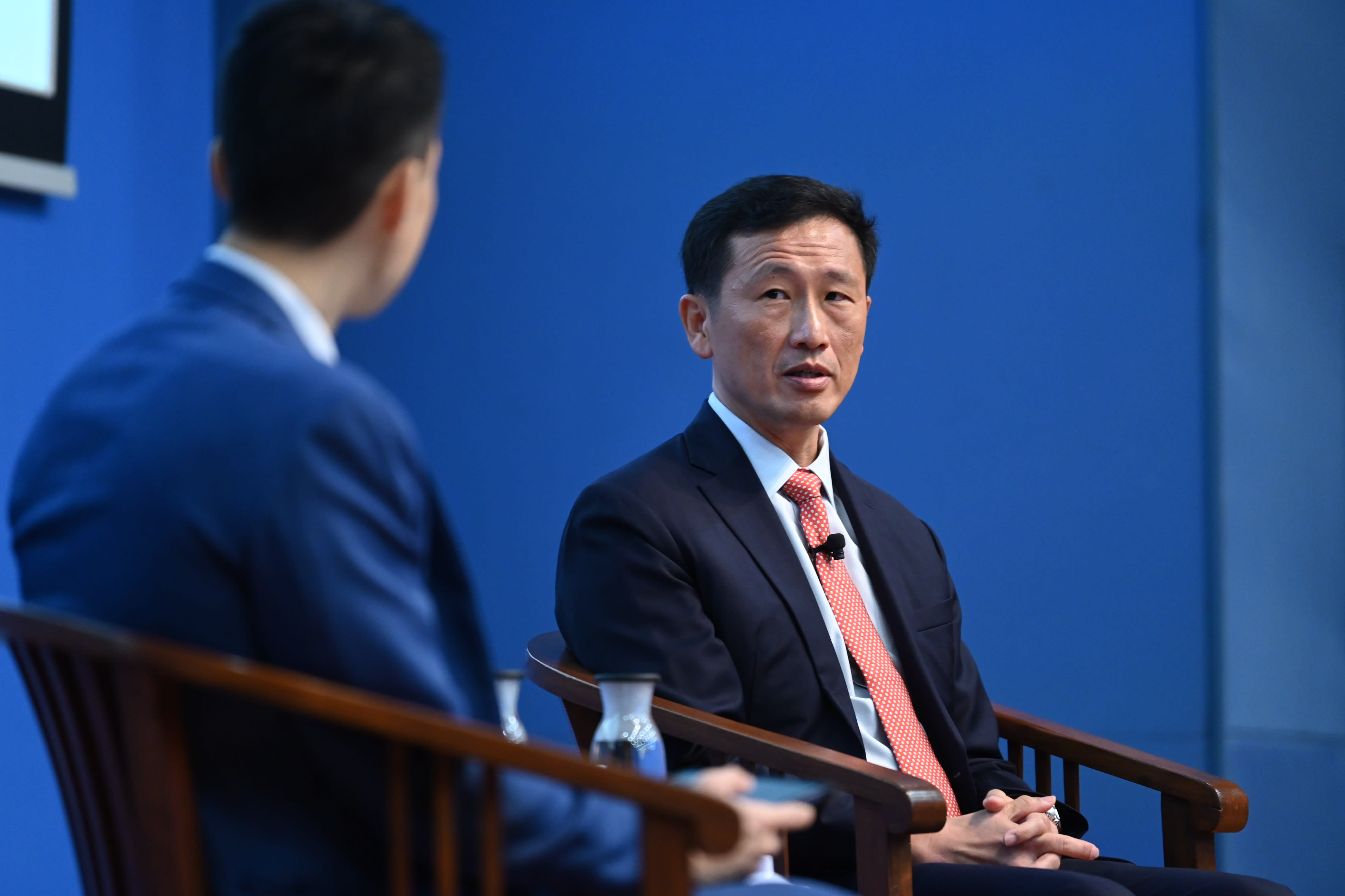'Ownself check ownself' is a virtue, S'pore in trouble if Govt can't ensure public accountability: Ong Ye Kung

Health Minister Ong Ye Kung, with moderator Woo Jun Jie from the Institute of Policy Studies, speaking at the Singapore Perspectives 2022 forum on Thursday (Jan 13).
- "Ownself check ownself" is a virtue, otherwise the Government cannot be accountable to the public, said Health Minister Ong Ye Kung
- The phrase was originally coined by Workers' Party chief Pritam Singh in 2015
- Mr Ong was responding to a question asked at a Institute of Policy Studies conference on Thursday
- Besides having institutions and a neutral civil service to ensure accountability, having an opposition presence in Parliament also helps to surface alternative views, he said
- Nevertheless, Mr Ong does not believe a two-party system will happen in Singapore given its small size

BY
NG JUN SEN
@SenTodayPublished January 13, 2022
Updated January 13, 2022
WhatsAppTelegramFacebookTwitterEmailLinkedIn
SINGAPORE — A government that has its own set of checks and balances is one that is accountable and functions well, which is why the Singapore Government's ability to "ownself check ownself" is a virtue, Health Minister Ong Ye Kung said on Thursday (Jan 13).
Mr Ong was making reference to a remark first made popular by Workers' Party chief Pritam Singh during an election rally on Sept 2, 2015, when he was criticising Emeritus Senior Minister Goh Chok Tong's comment that the ruling People's Action Party (PAP) exists in a political system where it is its own check.
"People can say 'ownself check ownself', but I see it always as a virtue — if ownself cannot check ownself, you're in big trouble," Mr Ong said at a forum organised by the Institute of Policy Studies (IPS).
During the panel discussion on Thursday morning, Mr Ong said Singapore is unlike other countries, where layers of civil servants leave every time the ruling political party changes.
Instead, Singapore has a "neutral, non-politicised" civil service, with an independent Public Service Commission to appoint the top civil servants, he noted, adding that state organs, such as the Auditor-General's Office, as well as the courts, also play a part in keeping the Government clean and functioning well.
"There will always be a role for different kinds of institutions, for checks and balances, (to) ensure that the executive branch is always accountable to the people," he added.
Mr Ong, who is also assistant treasurer of the PAP's central executive committee, was replying to a question from the virtual audience at the Singapore Perspectives 2022 conference on whether he believed a strong Singapore is compatible with having a strong opposition or even a two-party system as seen in some countries.
In his response, he also said that the presence of an opposition in Parliament allows alternative points of view to come forth and that the ruling PAP has to take these views seriously.
"All of this (put) together, I think we can have a fairly effective functioning state that serve the people," he said.
Mr Ong added he does not believe that a two-party system can arise in Singapore, even though some may argue that the Republic already has one now.
Unlike in larger countries such as the United States, where people's political views can differ greatly depending on which part of the country they live in and political parties can thus cater to these vastly different perspectives, Singaporeans do not have vastly different views from each other, he noted.
"Between Jurong and Changi, people worry equally about cost of living, about Covid-19, and in terms of fundamental views, it may differ from person to person, but not between regions," he said.
"So as a city state, if Singaporeans are unhappy with one policy, the Government can change it. If the Government does a good job and people are happy, it spreads throughout the island as well."
He said that as the ruling party, the PAP has to continue the good work of earlier generations, make sure that it is an accountable government that serves the people and ensure policies must make sense and acceptable for the majority, even if they may not please everyone.
"If we can do that, we can continue a good path and I feel this is the role of my party," he said.
Mr Ong, who is widely pegged as one of the main contenders for Singapore's next prime minister, had earlier on Thursday morning given a keynote speech on the rise and fall of global cities, and the sociopolitical factors that makes Singapore an effective city-state.
While other countries in the past had to contend with ideological contradictions between the right and the left, modern societies face new contradictions in inequality, protectionism and climate change — the three biggest issues that Mr Ong said nations must grapple with today.
This is why a strong state is needed, even as healthy discourse and the proper functioning of checks and balances remain important, he said.
"Our policies need to be consistent for the long term to make an impact. Unlike bigger countries, we cannot afford to be caught in fractious politics with frequent change of governments and reorientation of policies."
More crucially, Mr Ong said, challenges can be overcome with Singaporeans' sense of togetherness — the idea that people here are part of a close-knit tribe that has a better shot of the future by working together and making sacrifices for each other.
"Then something mysterious emerges, beyond security, beyond making a living, beyond creature comforts, like the soul of a nation," he said.



